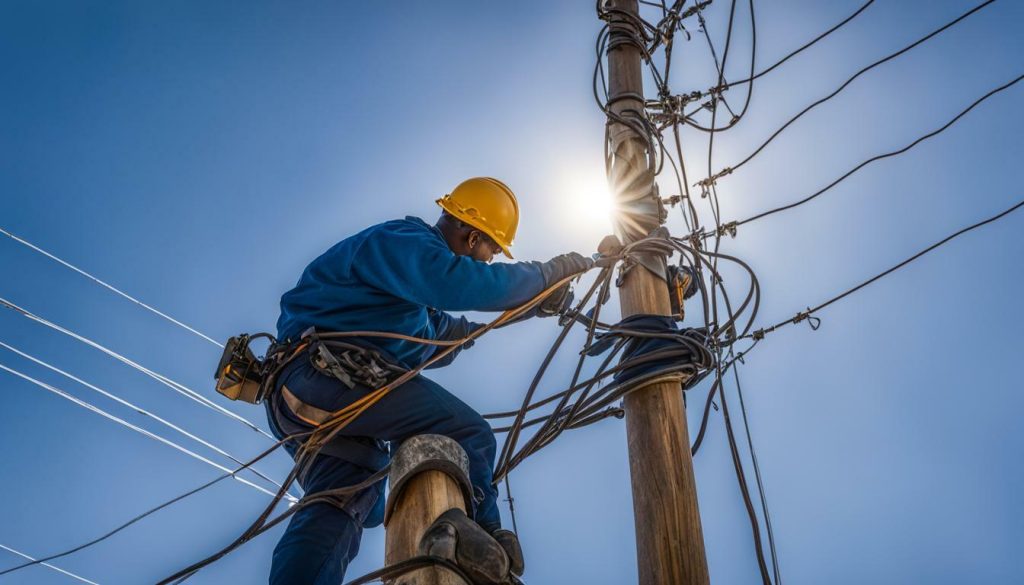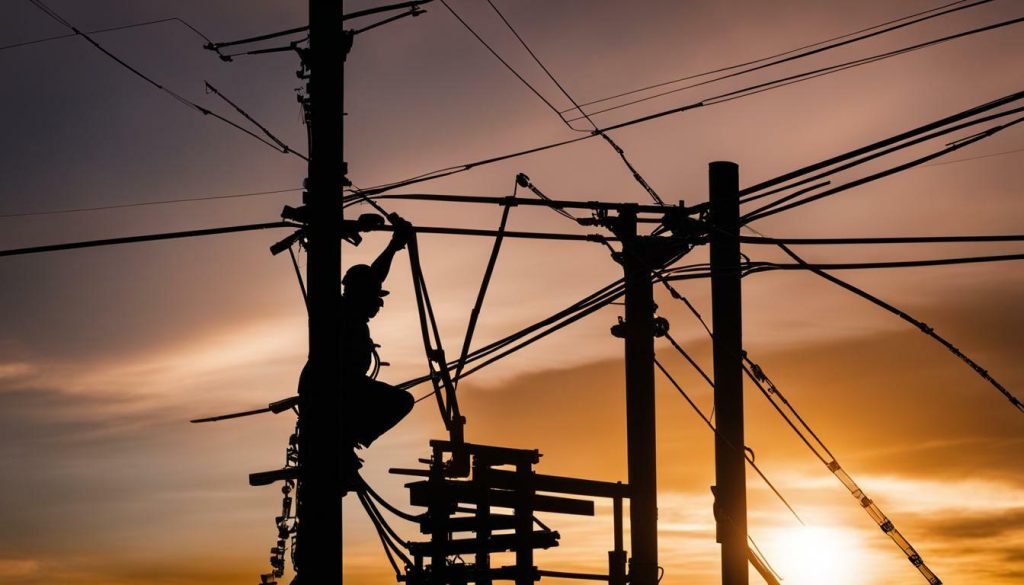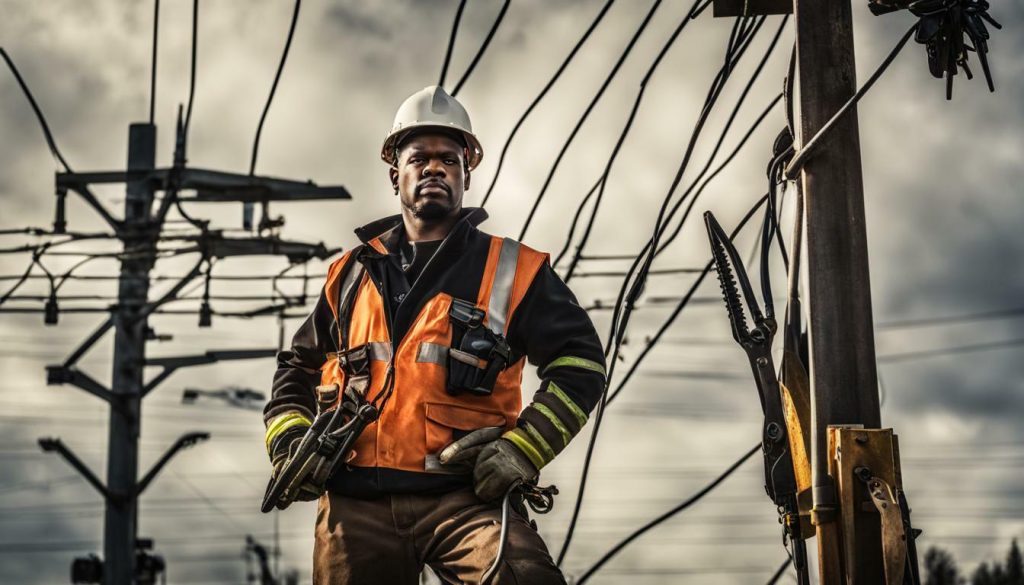
Are you ready to embark on a journey worth taking? Let’s explore the lineman career path and discover the exhilarating world of working with electricity.
A career as a lineman offers both challenges and rewards for individuals who have a strong interest in electricity and enjoy hands-on work. Linemen play a vital role in maintaining America’s power systems, ensuring that communities stay connected and powered. They are responsible for installing, repairing, and maintaining high-power electrical cables, often working for utility companies, electrical contractors, or government agencies.
To pursue a career as a lineman, several steps must be taken. It begins with earning a high school diploma or GED, followed by completion of a telecommunication or electricity program. Apprenticeships or practical programs offer valuable hands-on experience, while acquiring specialized certifications further enhance one’s qualifications.
Linemen require a strong understanding of electricity and technical skills. They work outdoors in various weather conditions, facing challenges such as working at great heights and exposure to extreme weather. Safety protocols are of utmost importance, demanding strict adherence to ensure the well-being of both the lineman and the public.
The job outlook for linemen is positive, with projected job growth and competitive wages. According to recent data, the median hourly wage for linemen in the United States is $31.95. Despite the challenges, linemen find fulfillment in their work, knowing that they are an integral part of maintaining power systems and keeping communities connected.
Key Takeaways:
- A career as a lineman involves installing, repairing, and maintaining high-power electrical cables.
- Steps to becoming a lineman include earning a high school diploma, completing a relevant program, and acquiring specialized certifications.
- Linemen need a strong understanding of electricity, technical skills, and the ability to work in various weather conditions.
- The job outlook for linemen is positive, with projected job growth and competitive wages.
- Despite the challenges, linemen find fulfillment in their role in maintaining power systems and keeping communities connected.
The Role of a Lineman: Installing, Repairing, and Maintaining Electrical Cables
As a lineman, your primary role is to ensure the seamless functioning of high-power electrical cables by expertly installing, repairing, and maintaining them. This crucial responsibility requires a combination of technical skills, physical stamina, and a deep understanding of electricity. Operating in a variety of settings, such as utility companies, electrical contractors, or government agencies, linemen play a vital role in keeping communities connected and powering essential infrastructure.
Installing electrical cables is one of the key tasks performed by linemen. This involves carefully and precisely placing cables in underground conduits or overhead poles, ensuring efficient distribution of electricity. Linemen must possess the dexterity to handle heavy cables and the ability to work at considerable heights, often using specialized equipment such as aerial lifts or bucket trucks.
Repairing and maintaining electrical cables is another critical aspect of a lineman’s role. Linemen are trained to identify and troubleshoot faults in the power system, using various diagnostic tools and equipment. They work diligently to rectify issues, whether it be fixing damaged cables, replacing faulty components, or conducting routine inspections to ensure optimal performance. This work often takes place in challenging conditions, including extreme weather or emergency situations, requiring linemen to adapt quickly and work efficiently.
It is essential for linemen to prioritize safety at all times. They adhere to strict protocols and regulations to minimize the risk of accidents and protect themselves and their team members. Linemen undergo rigorous training to develop the necessary skills and knowledge to perform their duties safely. Their commitment to safety is integral to maintaining the reliability and integrity of the power system.

Quality workmanship is at the core of a lineman’s role. Precision and attention to detail are essential when installing, repairing, and maintaining electrical cables. A single mistake can have significant consequences, potentially jeopardizing public safety and disrupting power supply to homes, businesses, and essential services. Linemen take immense pride in their work, knowing that their expertise directly contributes to the reliability and functionality of the power system.
The Rewards of a Challenging Career
While the role of a lineman presents its fair share of challenges, it also offers immense rewards. Linemen find fulfillment in knowing that their work is essential to the smooth functioning of communities and the well-being of their fellow citizens. Additionally, linemen enjoy competitive wages and ample opportunities for career growth, with the job outlook projected to remain positive as the demand for reliable electricity continues to rise. If you have a passion for electrical systems, a strong work ethic, and a desire to make a meaningful impact, a lineman career path may be the journey worth taking.
The Pathway to Becoming a Lineman: Education, Apprenticeships, and Certifications
To embark on your lineman journey, you’ll need to lay a strong foundation through education, apprenticeships, and certifications. A career as a lineman requires a combination of theoretical knowledge and practical skills to work effectively in the field.
First and foremost, obtaining a high school diploma or GED is essential to meet the minimum education requirement for becoming a lineman. This educational foundation provides the necessary groundwork for further learning and skill development.
After completing high school, aspiring linemen can enroll in a telecommunication or electricity program. These specialized programs offer in-depth training in electrical systems, safety protocols, and other crucial aspects of the trade. Through classroom instruction and hands-on practice, students gain the knowledge and skills needed to excel as linemen.
Apprenticeships play a vital role in the journey to becoming a lineman. By participating in an apprenticeship program, aspiring linemen can gain real-world experience under the guidance of experienced professionals. These programs typically last for several years and involve a combination of on-the-job training and classroom instruction. Apprenticeships provide valuable opportunities to apply theoretical knowledge in practical settings, honing essential skills and gaining industry-specific expertise.
Key Steps in the Lineman Career Path:
- Earn a high school diploma or GED
- Complete a telecommunication or electricity program
- Participate in an apprenticeship or practical program
- Acquire specialized certifications
In addition to education and apprenticeships, linemen often pursue specialized certifications to enhance their professional qualifications. These certifications demonstrate expertise in specific areas of the trade and can open doors to advanced career opportunities. Examples of certifications for linemen include the Journeyman Lineman Certification and the Certified Electrical Safety Compliance Professional (CESCP) designation.
The pathway to becoming a lineman requires dedication, perseverance, and a commitment to ongoing learning. By obtaining the necessary education, participating in apprenticeships, and acquiring certifications, individuals can lay a strong foundation for a successful career in this rewarding field.

As a lineman, honing a diverse set of skills and overcoming challenges are crucial for achieving success in your career. The role of a lineman requires a combination of technical expertise, physical endurance, and a commitment to safety. Let’s explore some of the essential skills that make up a lineman’s toolbox for success.
Technical Proficiency
One of the key skills every lineman must possess is a strong understanding of electricity and electrical systems. From installing and repairing cables to troubleshooting issues, linemen need to have a deep knowledge of electrical principles. This includes understanding voltage, current, resistance, and how they interact within power systems. By staying up to date with the latest industry standards and best practices, linemen can ensure their work is accurate and reliable.
Physical Fitness and Endurance
Working as a lineman is physically demanding, often requiring long hours of manual labor in harsh weather conditions and at great heights. It is essential for linemen to maintain a high level of physical fitness and endurance. This includes regular exercise, proper nutrition, and adequate rest to handle the rigors of the job. Strong hand-eye coordination, balance, and agility are also important attributes for linemen to perform tasks safely and efficiently.
Adherence to Safety Protocols
Safety is of utmost importance in the lineman profession. Linemen work with high-voltage electrical systems that pose significant risks if proper safety measures are not followed. Adhering to safety protocols and regulations is crucial to prevent accidents and ensure the well-being of both linemen and the public. Linemen must be vigilant about using personal protective equipment, practicing safe climbing techniques, and performing thorough risk assessments before starting any task.
Problem-Solving Skills
In the dynamic environment of power systems, linemen often encounter unexpected challenges and technical issues that require quick thinking and problem-solving skills. Whether it’s troubleshooting a faulty connection or finding alternative solutions to overcome obstacles, linemen need to think critically and make informed decisions on the spot. Being adaptable and having a problem-solving mindset are essential qualities for linemen.

To summarize, a lineman’s toolbox for success comprises of technical proficiency, physical fitness, adherence to safety protocols, and problem-solving skills. By continuously developing and refining these skills, linemen can excel in their profession and contribute to the reliable functioning of power systems. Despite the challenges they face, linemen find fulfillment in their work, knowing they play a crucial role in maintaining power systems and keeping communities connected.
Fulfillment and Prospects: The Bright Future of a Lineman
The lineman career path not only offers fulfillment in making a tangible impact but also promises a bright future with favorable job prospects and competitive wages. As a lineman, I have the opportunity to play a crucial role in maintaining power systems and keeping communities connected. Knowing that my work directly contributes to the smooth operation of America’s electrical infrastructure brings immense satisfaction.
With the increasing demand for reliable power supply, the job outlook for linemen remains highly positive. According to recent projections, the field is expected to experience significant growth in the coming years. This means that there will be ample opportunities for aspiring linemen to enter the profession and establish successful careers.
Aside from the promising job prospects, the financial rewards are also noteworthy. Linemen are well-compensated, with the median hourly wage in the United States being $31.95. This not only reflects the importance of the work we do but also recognizes the dedication, skill, and expertise required to excel in this field.
Of course, the lineman profession does come with its set of challenges. Working at great heights and being exposed to extreme weather conditions are just a few examples. However, these challenges only serve to further strengthen our skills and commitment to safety. By adhering to stringent protocols and utilizing our knowledge and experience, we can overcome these obstacles and continue to thrive in our roles.
FAQ
What is the role of a lineman?
Linemen are responsible for installing, repairing, and maintaining high-power electrical cables.
How do I become a lineman?
To become a lineman, you need to earn a high school diploma or GED, complete a telecommunication or electricity program, participate in an apprenticeship or practical program, and acquire specialized certifications.
What skills are required to be a lineman?
Linemen need a strong understanding of electricity, technical skills, and the ability to work outdoors in various weather conditions.
What challenges do linemen face?
Linemen face challenges such as working at great heights, exposure to extreme weather conditions, and the need for strict adherence to safety protocols.
What is the job outlook for linemen?
The job outlook for linemen is positive, with job growth projected to increase. The median hourly wage for linemen in the United States is $31.95.
Why do linemen find fulfillment in their work?
Linemen find fulfillment in their work because they play a crucial role in maintaining power systems and keeping communities connected.



